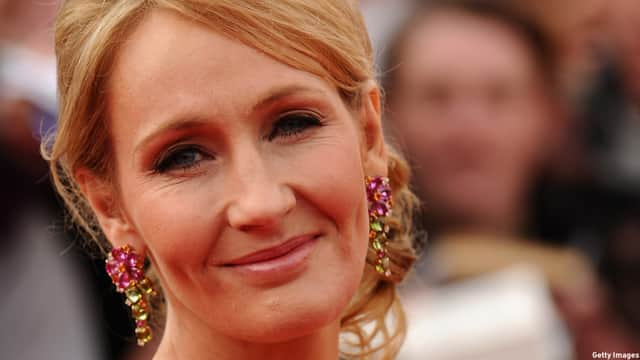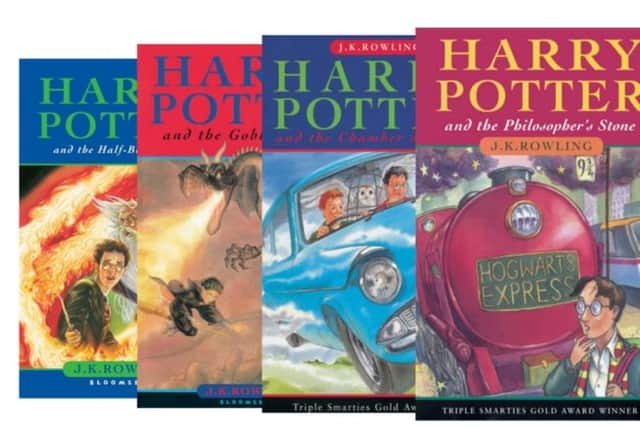Ten things you didn't know about JK Rowling


When talking about JK Rowling in the context of great Scots of the modern age, we should perhaps first dispense with the elephant in the room.
Joanne Rowling, was born in Yate, Gloucester, but has been an Edinburgh resident since 1993 and has earned the status of ‘Honorary Scot’ in our list of Remarkable Voices.
Advertisement
Hide AdAdvertisement
Hide AdHer life in Scotland began as she turned her back on a tempestuous personal life. The would-be children's author moved north to Scotland to be near her sister, arriving with her young daughter and three chapters of what would become Harry Potter.


Seven years after completing her University degree in French and Classics from Exeter University, Joanne was unemployed but considered her failures liberating as it left her free to write.
After wrestling with the struggles of single parenthood with clinical depression amid the rubble of a failed marriage, Rowling began a new life in Scotland and after filing for divorce in 1994, she began a teacher training course at Edinburgh University the following year.
She later confessed her mental illness had inspired the soul-sucking wraiths, known as Dementors, that guarded the prison of Azkaban in the wizarding world she set her books in.
By this time, she had written her first manuscript for Harry Potter and the Philosopher’s Stone, completed on a manual typewriter. It was submitted to 12 publishing houses. All turned her down.


The Harry Potter books have sold more than 400 million copies worldwide
If it were not for the demanding nature of an eight-year-old girl, the world may never have experienced Harry Potter series.
Rowling owes much to Alice Newton, daughter of Bloomsbury’s chairman, who was handed the first chapter by her father and immediately demanded the rest. The publishing house handed Rowling a £1,500 advance for her book, but was advised to enquire about a day job because there wasn’t much money to be made from writing children’s books.
Advertisement
Hide AdAdvertisement
Hide AdShe was warned against publishing the books under her own name, as her publisher feared young boys might not want to read a book about a boy wizard if it was written by a woman, so she adopted the pen name ‘J.K. Rowling’.


With no middle name to call her own, she borrowed the 'K' from her grandmother, Kathleen.
Bloomsbury and Rowling had pulled out all the stops to promote the title. While it didn’t make huge waves at first, she immediately gained the support of Edinburgh’s literary community.
One of the first reviews came from the Scotsman, who said it had “all the makings of a classic”.
“Rowling uses classic narrative devices with flair and originality and delivers a complex and demanding plot in the form of a hugely entertaining thriller. She is a first-rate writer for children.”


JK Rowling has lived in Edinburgh since 1993
The rest of the Harry Potter story is history. Six more books followed The Philosopher’s Stone, each one more popular and complex than the last. Her popularity wasn’t confined to the children’s market, as readers who began the journey as kids queued up for the later instalments to the series.
Today, The Harry Potter books have sold more than 400 million copies (and counting) and have been translated into 68 different languages. The film series took in over $8.5 billion at the global box office.
It transcended age generations and kickstarted a new passion for reading among those who had long ago found themselves too busy to read. More importantly, it brought people of different generations together to read together.
Advertisement
Hide AdAdvertisement
Hide AdFilms followed books, theme parks followed films and the Harry Potter universe keeps giving with companion books and one of the world’s most diverse and committed fan fiction communities.
Here in Scotland, she started her charity Lumos to support the 8 million children in institutional care so that they may one day regain their right to a normal family life and a wider goal of permanently abolishing child institutionalism.
Joanne remains in Edinburgh to this day. She is most vocal through her Twitter account, regularly answering queries about the characters in her books, passing off plot irregularities as mischief managed and a regular proponent of 140-character stand-offs in the name of social justice and equality.